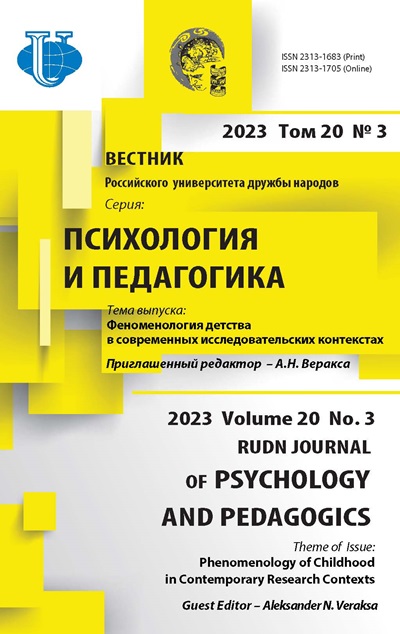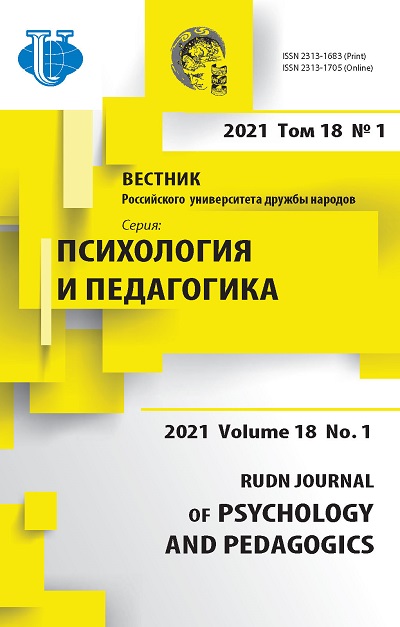Characteristics of Psychological Readiness for Social Activity as Determinants of Different Forms of its Manifestation among Russian Student Youth in the Saratov Region
- Authors: Arendachuk I.V.1
-
Affiliations:
- Saratov State University
- Issue: Vol 18, No 1 (2021)
- Pages: 64-84
- Section: PERSONALITY RESOURCES AND CHALLENGES OF CURRENT TIME: NATIONAL AND GLOBAL
- URL: https://journals.rudn.ru/psychology-pedagogics/article/view/26150
- DOI: https://doi.org/10.22363/2313-1683-2021-18-1-64-84
Cite item
Full Text
Abstract
In modern studies, there is a contradiction between the passivity of young people in the manifestation of their social activity and the ideas of society about their progressive role in the development of civilization. In this regard, it becomes especially relevant to solve the problem of increasing the involvement of student youth in social processes through the search for factors that determine their psychological readiness for social activity, as aimed at being included in socially transformative activities, allowing young people to realize their potential in various spheres of life. In order to find a solution to this problem, a study aimed at analyzing the determinants of psychological readiness of Russian students to manifest various forms of social activity was conducted. The empirical study was carried out on a sample of students who live in the Saratov region and study in organizations of secondary vocational and higher education (Russian Federation, Saratov, N = 197; aged 18 to 23). The characteristics of psychological readiness were identified using the following methods: Personality Emotional Orientation Assessment (B.I. Dodonov, verified by N.A. Belskaya), General Self-Efficacy Scale (R. Schwarzer, M. Erusalem, adapted by V.G. Romek), Readiness for Self-Development (V.L. Pavlov) and Personal Change-Readiness Survey (A. Rolnik, S. Hezer, M. Gold, K. Hull, adapted by N.A. Bazhanova and G.L. Bardier). The intensity of social activity and different forms of its manifestation was determined using a questionnaire developed by a team of authors (R.M. Shamionov et al.). The study revealed some specific features in the determination of various forms of social activity by characteristics of psychological readiness for their manifestation among Russian students. It is shown that social activity in different forms of its manifestation can be determined by personal emotional orientation as a characteristic of emotional readiness, self-efficacy as an indicator of readiness to overcome difficulties in a social context, and characteristics of personal readiness for change, among which passion (energy), confidence and ingenuity dominate. It is found that, among young students, psychological readiness to the greatest extent determines the intensity of subcultural, altruistic and educational-developing forms of social activity, minimally associated with the manifestation of socio-political and Internet network forms of activity and is not associated with religious activity.
About the authors
Irina V. Arendachuk
Saratov State University
Author for correspondence.
Email: arend-irina@yandex.ru
PhD in Psychology, is Associate Professor of the Social Psychology of Education and Development Department
83 Astrakhanskaya St, Saratov, 410012, Russian FederationReferences
- Arendachuk, I.V. (2020). Activity characteristics of social activity in young people belonging to different age groups. Izvestiya of Saratov University. New Series. Educational Aсmeology. Developmental Psychology, 9(2), 148–161. https://doi.org/10.18500/2304-9790-2020-9-2-148-161 (In Russ.)
- Balog, A.I. (2015). Social activity of student youth. Historical and Social Educational Ideas, 7(6-2), 143–146. (In Russ.)
- Baranova, G.V. & Baranov, A.A. (2013). Social activity (the experience of methodological analysis). RSUH/RGGU Bulletin. Philosophy. Social Studies. Art Studies Series, (2), 233–242. (In Russ.)
- Bazhanova, N.A. (2005). Lichnostnaya gotovnost' k peremenam v kontekste issledovaniya fenomena “ozhidaniya” (Perevod i aprobaciya oprosnika “Personal change-readiness survey”). Acta Eruditorum, (2), 169–178. (In Russ.)
- Belskaya, N.A. (2013). The mathematical verification of emotional orientation method’s construct validity. Izvestiya of Saratov University. New Series. Series: Philosophy. Psychology. Pedagogy, 13(4), 46–50. (In Russ.)
- Blinova, V.L. (2015). Theoretical model of personality's readiness for self-development formation. Izvestiya of Saratov University. New Series. Educational Aсmeology. Developmental Psychology, 2020, 2(1), 16–20. (In Russ.)
- Bocharova, E. E. (2018). Regulatory and worldview factors of various forms of social activity of young people. Izvestiya of Saratov University. New Series. Series: Educational Aсmeology. Developmental Psychology, 7(4), 333–345. https://doi.org/10.18500/2304-9790-2018-7-4-333-345 (In Russ.)
- Boitzova, A.V., & Simonova, N.N. (2019). “Psychological readiness”. Definition and approaches. Advances in Social Science, Education and Humanities Research. II International Scientific-Practical Conference "Psychology of Extreme Professions" (ISPCPEP 2019), 321, 21–24. https://doi.org/10.2991/ispcpep-19.2019.5
- Bubchikova, N.V., & Chikova. I.V. (2013). Motivacionno-cennostnaya sfera lichnosti budushhego pedagoga kak komponent psihologicheskoy gotovnosti. Vestnik Orenburgskogo Gosudarstvennogo Universiteta, (2), 32–36. (In Russ.)
- Crocettia, E., Jahromib, P. & Meeusc, W. (2012) Identity and civic engagement in adolescence. Journal of Adolescence, 35(3), 521–532. https://doi.org/10.1016/j.adolescence.2011.08.003
- Derbeneva, M.Yu. (2009). Emocionalnaya napravlennost' kak osnova formirovaniya poznavatelnyh interesov lichnosti. Vestnik of Saint Petersburg University. Ser. 12. Psychology. Sociology. Pedagogics, (1-1), 288 – 294. (In Russ.)
- Desplaces, D. E. (2005). A multilevel approach to individual readiness to change. Journal of Behavioral and Applied Management, 7(1), 25–39. https://doi.org/10.21818/001c.14568
- Dodonov, B.I. (1978). Emociya kak tcennost'. Moscow: Politizdat. (In Russ.)
- Dyachenko, M.I., & Kandybovich L.A. (1976). Psihologicheskie problemy gotovnosti k deyatel'nosti. Minsk: BGU Publ. (In Russ.)
- Furedi, F. (2009). Socialisation as behaviour management and the ascendancy of expert authority. Amsterdam: Vossiuspers UvA. 26 p.
- Galanina, N.V. (2016). Understanding the determination of the philosophical analysis. Vestnik Moskovskogo universiteta MVD Rossii, (2), 21–23. (In Russ.)
- Grasso, M. (2018) Young People’s Political Participation in Europe in Times of Crisis. Young People Re-Generating Politics in Times of Crises. Palgrave Studies in Young People and Politics, 179–196. London: Palgrave Macmillan, Cham. https://doi.org/10.1007/978-3-319-58250-4_10
- Grigoryeva, M.V. (2019). Students' readiness for changes as a predictor of social activity. The European Proceedings of Social & Behavioural Sciences, LVI, 43–48. https://dx.doi.org/10.15405/epsbs.2019.02.02.6
- Gupta, L., Malik, А. &Singh R. (2016). Construct of Psychological Preparedness and its Correlates. The International Journal of Indian Psychology, 3(8(2)), 73–79.
- Ivanenkov, S.P., & Kostrikin, A.V. (2009). Problemy issledovaniya sotsial'noy aktivnosti molodezhi. Credo New, (3), 82–100. (In Russ.)
- Jeznik, K. (2016) Social images of youth as a challenge for mentoring work. Studies in Adult Education and Learning, 22(2), 39–52. https://doi.org/doi.org/10.4312/as.22.2.39-52
- Khanova, Z.G. (2016). Psychological readiness of students for entrepreneurial activity. Herald of the University of the Russian Academy of Education, (3), 66–72. (In Russ.)
- Kharlanova, E.M. (2011) Research of Social Activity of Students. Historical and Social-Educational Ideas, (5), 173–178. (In Russ.)
- Klenova, M.A. (2018). Problems and perspectives of the study of young people’s social activity. Izvestiya of Saratov University. New Series. Series: Educational Aсmeology. Developmental Psychology, 7(4), 319–325. https://doi.org/10.18500/2304-9790-2018-7-4-319-325 (In Russ.)
- Leonova, E.V. (2018). Psychological preparedness of students for innovative work. Higher Education Today, (7), 56–59. https://doi.org/10.25586/RNU.HET.18.07.P.56 (In Russ.)
- Minakhmetova, А.Z., Gataullina, R.F., & Adigamova E.B. (2019). Model of formation of psychological readiness of students to volunteering. Kazan Pedagogical Journal, (4), 119–124.
- Moss, P., & Moss, G (2008). Toward a new public education: making globalization work for us all. Child Development Perspectives, 2(2), 114–119. https://doi.org/doi.org/10.1111/j.1750-8606.2008.00051.x
- Mychko, E.I., & Zyolko, A.S. (2013). The problem of psychological readiness to professional activities in future teachers. Psychological Science and Education, 18(4), 23–27. (In Russ.)
- Nam, M.V. (2003). Formirovanie social'noy aktivnosti starshih shkol'nikov. Modernizaciya pedagogicheskogo obrazovaniya: problemy, poiski, resheniya, 105–108. Ufa: BGPU Publ. (In Russ.)
- Nosova, E.S. (2007). Formation of psychological readiness to voluntary of aktitvity. Siberian Journal of Psychology, (25), 186–190 (In Russ.)
- Pickard, S. (2020). The nature of environmental activism among young people in Britain in the twenty-first century. In B. Prendiville & D. Haigron (Eds.), Political Ecology and Environmentalism in Britain (pp. 89–110). Cambridge: Cambridge Scholars Publishing.
- Plotnitskaya, M.R., Frizen, М.А., & Shuchkovskaya, E.S. (2015). Psychological readiness of the individual to self-development: conceptualization and research. Bulletin of Chelyabinsk State Pedagogical University, (9), 136–141. (In Russ.)
- Popova, S.Yu., & Selezneva, A.V. (2018). Social activity of youth: status, problems and prospects for development. Personality Formation, (2), 96–103. (In Russ.)
- Ratanova, T.A. & Shlyakhta, N.F. (2003). Psihodiagnosticheskie metody izucheniya lichnosti. Moscow: MPSI; Flinta. (In Russ.)
- Sanzhayeva, R.D. (2016). Readiness and its psychological mechanisms. BSU Bulletin. Education. Personality. Society, (2), 6–16. (In Russ.)
- Savastina, A.A., & Osipova, L.B. (2015). Social activities of youth as a condition of dynamic development company. Modern Problems of Science and Education, (2–2). Retrieved September 2, 2020, from http://science-education.ru/ru/article/view?id=22320 (In Russ.)
- Schusler, T., Krings, A., & Hernández, М. (2019). Integrating youth participation and ecosocial work: New possibilities to advance environmental and social justice. Journal of Community Practice, Ecosocial Work and Social Change in Community Practice, 27(3–4), 460–475. https://doi.org/10.1080/10705422.2019.1657537
- Serek, J., Machackova, H., & Macek P. (2018). Who crosses the norms? Predictors of the readiness for non-normative political participation among adolescents. Journal of Adolescence, 62, 18–26. https://doi.org/10.1016/j.adolescence.2017.11.001
- Shamionov, R.M. (2018). Social Activity of Personality and Groups: Definition, Structure and Mechanisms. RUDN Journal of Psychology and Pedagogics, 15(4), 379–394. https://doi.org/10.22363/2313-1683-2018-15-4-379-394 (In Russ.)
- Shatyr, Yu.A., Mulik, I.G., Ulesikova, I.V., Bulateckij S.V., & Mulik, A.B. (2017) Optimization of evaluation of expressiveness and direction of human social activity. Nauka molodyh (Eruditio Juvenium), 5(4), 393–405. https://doi.org/10.23888/HMJ20174393-405 (In Russ.)
- Shubovich, M.M., Eremina, L.I., Bibikova, N.V., & Plohova, I.A. (2019). Readiness of future teachers of physical culture to social transforming voluntary activity. The Russian Journal of Physical Education and Sport, 14(2), 76–82. https://doi.org/10.14526/2070-4798-2019-14-2-76-82 (In Russ.)
- Shvarcer, R., Erusalem, M., & Romek, V. (1996). Russkaya versiya shkaly obshhei samoeffektivnosti R. Shvarcera i M. Erusalema. Inostrannaya Psihologiya, (7), 71–77. (In Russ.)
- Sokolova, E.S. (2011) Social activity of contemporary Russian youth. Znanie. Ponimanie. Umenie (Knowledge. Understanding. Skill), (1), 197–202. (In Russ.)
- Subhanov, N. (2017). Peculiarities of youth developing in the conditions of forming of civil society. European Science Review, (1–2), 171–173. http://dx.doi.org/10.20534/ESR-17-1.2-171-173
- Vyatkin, A.P. (2006). The problem of psychological ready to economic activity. Izvestiya of Irkutsk State Economics Academy, (3), 97–100. (In Russ.)
- Zhechev, Z. (2015). Theoretical research approaches to finding the interconnection between socialization and social activity. SociоBrains, (5), 48–53.
- Zhukova, V.F. (2012). Psihologo-pedagogicheskiy analiz kategorii “Psihologicheskaya gotovnost'”. Bulletin of the Tomsk Polytechnic University, 320(6), 117–121. (In Russ.)
















